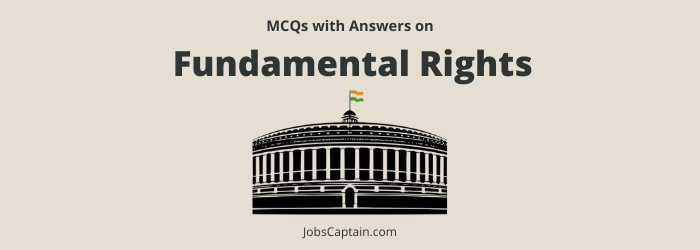
This quiz set on Fundamental Rights will help you revise the key concepts and prepare for exams. The quiz has 25 questions and answers.
| Quiz Set | 1 | 2 | 3 | 4 | MCQ on Indian Polity and Governance |
Question 1: Which Article of the Constitution of India is related with Freedom of the Press?
(A) Article 19
(B) Article 20
(C) Article 21
(D) Article 22
Question 2: Article 25 of the Indian Constitution refers to __________.
(A) Right to Equality
(B) Right to Property
(C) Freedom of Religion
(D) Protection of Minorities
Question 3: Under which Article Scheduled Castes and Scheduled Tribes have been granted fundamental, socioeconomic, political, and cultural rights?
(A) Article 20
(B) Article 19
(C) Article 18
(D) Article 17
Question 4: Which one of the following is not properly matched?
(A) Article 23 – Prohibition of traffic in human and forced labor
(B) Article 24 – Prohibition of employment of children in factories
(C) Article 26 – Freedom to manage religious affairs
(D) Article 29 – Freedom of establishment and administration of educational institutions by minorities
Question 5: Indian Constitution does not give right to freedom of the Press, but it is included in __________.
(A) Article 19(1)(a)
(B) Article 19(1)(b)
(C) Article 19(1)(c)
(D) Article 19(1)(d)
Question 6: Which one of the following pairs is not correctly matched?
(A) Prohibition of traffic in human beings and forced labour – Article 23
(B) Protection of interests of minorities – Article 29
(C) Right to constitutional remedies – Article 32
(D) Right of minorities to establish and administer educational institutions – Article 31
Question 7: In which Article the Fundamental Rights to Freedom of Speech and Expression is provided in the Constitution of India?
(A) Article 14
(B) Article 19
(C) Article 21
(D) Article 22
Question 8: Which Article of the Constitution protects the ‘Right of minorities to establish and administer educational institutions of their choice’?
(A) 19
(B) 26
(C) 29
(D) 30
Question 9: Freedom of News Papers in India __________.
(A) Specially provided by Article 19(1)(a)
(B) Is secured under Article 19(1)(b)
(C) Secured by Article 361-A
(D) Has origin by the enforcement of Rule of law
Question 10: Which of the following rights can be enforced under Article 32 of the Indian Constitution?
(A) Constitutional Rights
(B) Fundamental Rights
(C) Statutory Rights
(D) All of the above
Question 11: As a part of the Right to Freedom, which one of the following does not form part of ‘Freedom to Assemble Peaceably and Without Arms’?
(A) Gherao officials not performing their duties
(B) Peaceful assembly
(C) People who assemble should not bear arms
(D) State can make a law imposing reasonable restrictions on the exercise of this Right
Question 12: Which one of the following statements is not correct?
(A) K.M. Munshi was one of the members of the drafting committee of the Constitution
(B) The Constitution of India was adopted by the Constituent Assembly
(C) The Pachayati Raj was recommended by Balwant Rai Mehta Committee Report-1957
(D) The President of India is the Guardian of Fundamental Rights under the Constitution
Question 13: By which of the following grounds, a citizen’s freedom of expression may not be subjected to restriction?
(A) Sovereignty of India
(B) Public order
(C) Contempt of Court
(D) Unbecoming criticism
Question 14: Under the Indian Constitution who is the guardian of the fundamental rights?
(A) Parliament
(B) President
(C) Supreme Court
(D) Cabinet
Question 15: Which Article of the Constitution of Indian Republic relates to the Protection of ‘Life and Personal Liberty’?
(A) Article 19
(B) Article 21
(C) Article 20
(D) Article 22
Question 16: Under the Indian Constitution who amongst the following is considered to be the guardian of the fundamental rights?
(A) Parliament
(B) President
(C) Judiciary
(D) Prime Minister
Question 17: Which Article of the Indian Constitution protects a person’s right to travel abroad?
(A) 14
(B) 19
(C) 21
(D) None of the above
Question 18: Which one of the following is regarded as the protector of fundamental rights of citizens and Guardian of the Constitution of India?
(A) The Parliament
(B) The Attorney General
(C) The Supreme Court
(D) The President
Question 19: Which one of the following rights is available under Article 19(1)(d) read with Article 21?
(A) Right to travel abroad
(B) Right to shelter
(C) Right to privacy
(D) Right to information
Question 20: Which one of the following rights was described by Dr. B.R. Ambedkar as the ‘Heart and Soul of the Constitution?
(A) Right to Freedom of Religion
(B) Right to Property
(C) Right to Equality
(D) Right to Constitutional Remedies
Question 21: Which one of the following does not fall within the purview of article 21 of the Constitution?
(A) Medical aid to injured by a doctor
(B) Sexual Harassment of Women at workplace
(C) Pollution of the quality of water
(D) Capital punishment
Question 22: Which one of the following Articles was termed as the ‘Heart and Soul of the Constitution’ by Dr. B.R. Ambedkar?
(A) Article 14
(B) Article 25
(C) Article 29
(D) Article 32
Question 23: According to Article 25 of the Constitution ‘Right to Freedom of Religion’ is not subjected to ________.
(A) Public Order
(B) Health
(C) Morality
(D) Humanism
Question 24: Which one of the following writs can be issued by a High Court to secure the liberty of the individual?
(A) Mandamus
(B) Quo-warranto
(C) Habeas Corpus
(D) Prohibition
Question 25: Under which Article of the Indian Constitution wearing of ‘Kripans’ by Sikhs is deemed as a right to freedom of religion?
(A) Article 24
(B) Article 25
(C) Article 26
(D) Article 27
| Quiz Set | 1 | 2 | 3 | 4 | MCQ on Indian Polity and Governance |
